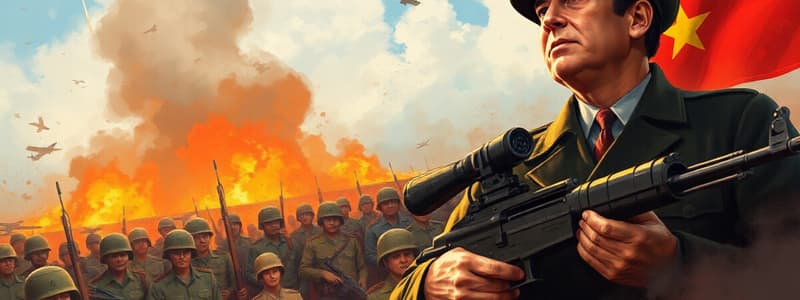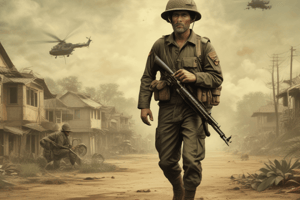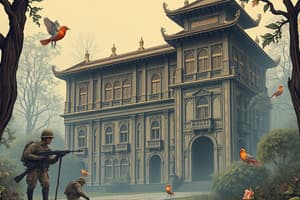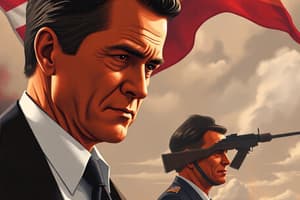Podcast
Questions and Answers
The Vietnam War was primarily fought between which two opposing sides?
The Vietnam War was primarily fought between which two opposing sides?
- Communist China and Democratic South Korea
- Communist North Vietnam and Democratic South Vietnam (correct)
- Democratic North Vietnam and Communist South Vietnam
- The United States and North Vietnam
Which U.S. president began the policy of sending "military advisors" to Vietnam?
Which U.S. president began the policy of sending "military advisors" to Vietnam?
- Dwight D. Eisenhower (correct)
- Richard Nixon
- John F. Kennedy
- Lyndon B. Johnson
What was the main reason the United States supported South Vietnam?
What was the main reason the United States supported South Vietnam?
- To support French colonial interests
- To gain control of Vietnam's natural resources
- To establish a military base in Southeast Asia
- To prevent the spread of communism (correct)
What was the term for the theory that if South Vietnam fell to communism, other nearby countries would follow?
What was the term for the theory that if South Vietnam fell to communism, other nearby countries would follow?
Which event during the Vietnam War significantly swayed U.S. public opinion against the war?
Which event during the Vietnam War significantly swayed U.S. public opinion against the war?
What strategy did Nixon employ to try and force North Vietnam to negotiate?
What strategy did Nixon employ to try and force North Vietnam to negotiate?
What was the name of the secret bombing campaign authorized by Nixon in Cambodia and Laos?
What was the name of the secret bombing campaign authorized by Nixon in Cambodia and Laos?
Which of these actions did Nixon take to reduce America's involvement in the Vietnam War?
Which of these actions did Nixon take to reduce America's involvement in the Vietnam War?
Under which president did the Vietnam War officially come to an end?
Under which president did the Vietnam War officially come to an end?
What promise did Nixon make during his 1968 presidential campaign regarding the Vietnam War?
What promise did Nixon make during his 1968 presidential campaign regarding the Vietnam War?
Flashcards
Vietnam War
Vietnam War
Conflict fought between North Vietnam (communist) and South Vietnam (democratic, supported by the U.S.) from 1955-1975.
Domino Theory
Domino Theory
The belief that if one country falls to communism, surrounding countries will follow.
Tet Offensive
Tet Offensive
Massive military operation by North Vietnam against South Vietnam and American forces in 1968.
Madman Theory
Madman Theory
Signup and view all the flashcards
Operation Menu
Operation Menu
Signup and view all the flashcards
Gerald Ford
Gerald Ford
Signup and view all the flashcards
Study Notes
- The Vietnam War was a conflict fought from the mid-1950s to 1975.
- The official dates of the war are considered to be 1955-1975.
- The war occurred during the administrations of five presidents: Dwight D. Eisenhower, John F. Kennedy, Lyndon B. Johnson, Richard Nixon, and Gerald Ford.
- The war was between communist North Vietnam and democratic South Vietnam, which was supported by the United States.
- The U.S. supported South Vietnam due to the Domino Theory, fearing that if South Vietnam fell to communism, other nearby countries would follow.
- The Vietnam War was unpopular with the American public.
Nixon Inherits the War
- Richard Nixon was the 37th President of the United States, serving from 1969-1974.
- Nixon inherited the Vietnam War, similar to Lyndon B. Johnson.
- During the 1968 election campaign, the Tet Offensive occurred, a major military operation by North Vietnam against South Vietnam and American forces.
- The Tet Offensive influenced the U.S. decision to withdraw from Vietnam.
- Nixon pledged to end the Vietnam War with "peace with honor" and promised to end the draft.
Nixon and Vietnam
- The Vietnam War was highly unpopular when Nixon took office, with many American soldiers being killed.
- Nixon adopted the "madman theory" to make himself appear unpredictable to North Vietnam, hoping they would negotiate.
- The North Vietnamese remained committed to their goals, and anti-war sentiment in the U.S. led them to believe the U.S. might withdraw.
- Nixon secretly authorized covert operations, such as Operation Menu, involving the bombing of Cambodia and Laos from 1969-1970.
- Despite military success, these bombings did not deter the North Vietnamese.
- Nixon implemented troop withdrawals and ended the draft in 1973.
- The American government was losing hope of winning the war.
- The Vietnam War officially ended under President Gerald Ford in 1975.
- Richard Nixon was instrumental in winding down the war, realizing it was not worth fighting and initiating its closure.
Studying That Suits You
Use AI to generate personalized quizzes and flashcards to suit your learning preferences.




